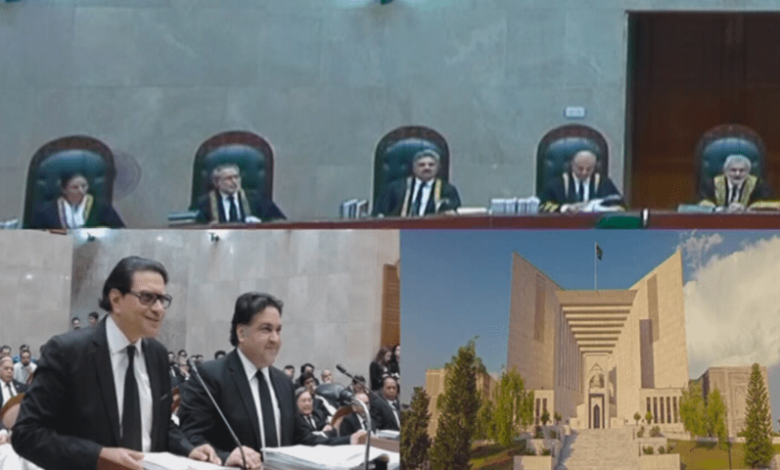SC full court hears Sunni Ittehad Council’s plea against denial of reserved seats – Pakistan


A full bench of the Supreme Court is currently hearing the Sunni Ittehad Council’s (SIC) plea against the denial of reserved seats in assemblies for women and minorities.
The SIC had earlier been joined by PTI-backed independent candidates after they won the Feb 8 elections as their party had been deprived of its electoral symbol ‘bat’ in an SC ruling.
On May 6, a three-member SC bench had suspended the Peshawar High Court’s (PHC) verdict denying the SIC — the new home for PTI lawmakers-elect — reserved seats.
Later the same month, the PPP — a major beneficiary along with the PML-N of the Election Commission of Pakistan (ECP) March 3 verdict to distribute the seats among other parliamentary parties — nominated senior counsel Farooq H. Naek to represent the party in the case.
In accordance with the apex court’s May 6 ruling, the ECP had then suspended victory notifications of 77 lawmakers allocated reserved seats in addition to the ones distributed earlier, causing the ruling coalition to lose its two-thirds majority in the National Assembly.
Last week, a full court had been formed to hear the case, comprising all judges except Justice Musarrat Hilali.
Subsequently, a 13-member bench — comprising Justices Syed Mansoor Ali Shah, Munib Akhtar, Yahya Afridi, Aminuddin Khan, Jamal Khan Mandokhail, Muhammad Ali Mazhar, Ayesha Malik, Athar Minallah, Syed Hasan Azhar Rizvi, Shahid Waheed, Irfan Saadat Khan and Naeem Akhtar Afghan — resumed hearing the case today.
The proceedings are being broadcast live on the SC’s website and YouTube channel.
Advocates Salman Akram Raja appeared as the SIC counsel while Faisal Siddiqi was present on behalf of the party’s female candidates who were denied the reserved seats.
Meanwhile, in a press release issued today, the Pakistan Bar Council (PBC) said it “vehemently condemned” the PTI’s demand that CJP Isa recuse himself from benches hearing cases related to the party.
It termed the demand a “tactic being used to put pressure” on the top judge, denouncing it as “extremely deplorable”.
Asserting that Justice Isa was a “very competent, upright and independent judge”, the PBC “rejected any tactic to malign the institution of judiciary […] and motives to target” the CJP.
The hearing
At the outset of the hearing, the SIC counsels came to the rostrum, with Siddiqi reading aloud the May 6 order.
Reiterating grounds presented in a petition, he stated that the allocation of the reserved seats to other parties was in violation of Articles 51(vi)(d) and (e) of the Constitution.
The lawyer read out an ECP letter dated April 24 as stating that the SIC was a parliamentary party “having 82 general seats in the National Assembly” and was therefore entitled to reserved seats.
Here, CJP Isa asked Siddiqi who the beneficiaries were in the case and to give a detailed breakdown of the reserved seats distributed to the ruling coalition parties above the initially allocated ones. Complying with the order, the lawyer informed the court of the number of seats for women from each province in the NA and minority seats.
Upon a discrepancy in the numbers arising, Siddiqi pointed out that the electoral watchdog had “made a few mistakes” and had contradictory statements mentioning a total of “77 or 78” such reserved seats.
Legal tussle for reserved seats
In a 4-1 verdict in March, the ECP had ruled that the SIC was not entitled to claim quota for reserved seats “due to having non curable legal defects and violation of a mandatory provision of submission of party list for reserved seats”.
The commission had also decided to distribute the seats among other parliamentary parties, with the PML-N and the PPP becoming major beneficiaries with 16 and five additional seats while the Jamiat Ulema-i-Islam Fazl was given four.
Later the same month, the PHC had dismissed an SIC plea challenging the ECP decision and denied it reserved seats.
In April, the SIC filed a petition before the SC — moved by party chief Sahibzada Hamid Raza — seeking to set aside the PHC judgment.
Subsequently, a three-member bench headed by Justice Mansoor Ali Shah and also including Justice Muhammad Ali Mazhar and Justice Athar Minallah took up the appeal and suspended the PHC and ECP verdicts, clarifying it applied only to the reserved seats distributed over and above the initially allocated ones to political parties.
“It is paramount to prioritise the integrity of the elections so that the Parliament remains a true reflection of the will of the people,” the written order had noted.
In a follow-up to the SC order, the ECP had suspended victory notifications of 77 lawmakers elected on reserved seats that had been denied to the SIC.
The suspended lawmakers included 44 from the PML-N, 15 from the PPP, 13 from Jamiat Ulema-i-Islam-Fazl (JUI-F) and one each from the PML-Q, Istehkam-i-Pakistan Party, PTI-Parliamentarians, Muttahida Qaumi Movement-Pakistan (MQM-P) and the Awami National Party (ANP).
Resultantly, the ruling coalition has lost its two-thirds majority in the National Assembly for now, with its numerical strength shrinking to 209 from 228.
More to follow
Source link